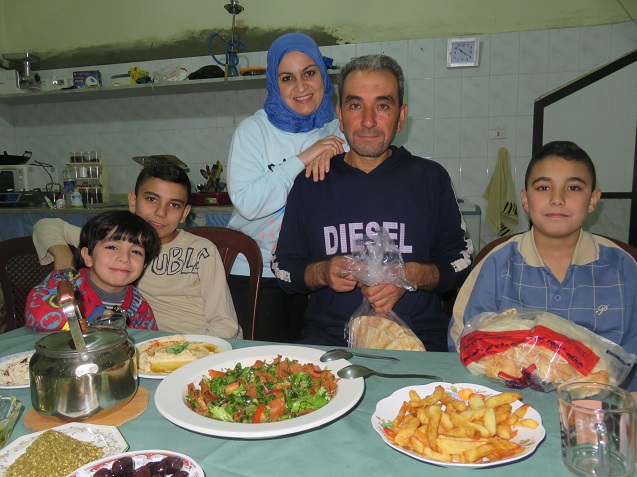
I spent my Thanksgiving in Bire, a small town in northern Lebanon about an hour from Tripoli and within sight of the Syrian border, across from the ancient city of Homs. It is a village of maybe 5,000 Lebanese residents but now is more than twice its original size as it has swelled with Syrians who have fled the brutal civil war in their country.
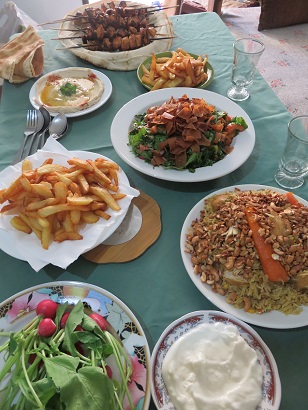
I almost choked. Right before flying to Beirut, I had attended the hearing of the Judiciary Committee of the US House of Representatives, at which several Republicans boldly and without any apparent shame proposed rejecting all Syrians, or at least all Syrian Muslims. “Can you name one suicide terrorist who was not a Muslim?” Rep. Steve King of Iowa asked a State Department spokesperson.
Their entire lives have been on “pause” for nearly five years, since civil war broke out in Syria.
Responding to Dalia’s question, I hesitated, trying to think of the least offensive way to describe the full House vote a couple of days later, which demanded a suspension in acceptance of Syrian and Iraqi refugees until national security agencies can certify they don’t pose a security risk (an impossible task because how can one ever prove a negative?). The bill now is headed to the Senate, fueled by unsubstantiated reports that “jihadist” cells are hiding among the refugees in Lebanon.
“The Republicans and the few Democrats who support them say they want a ‘pause’ in the review of Syrian refugees for resettlement,” I tried to explain. “They want the president to guarantee without a doubt you’re not terrorists.”
I looked around the restaurant-turned-refugee-home, a cavernous building with furniture handmade by Dalia’s husband, Abdullah; curtains bought at a secondhand shop; and a still scraggly garden where the family is trying to grow their own potatoes, radishes and mint. Their entire lives have been on “pause” for nearly five years, since civil war broke out in Syria. Fatigue from working long hours as a bus driver and, whenever he can, as a construction laborer is clear around Abdullah’s eyes. What could I do but apologize for my country?
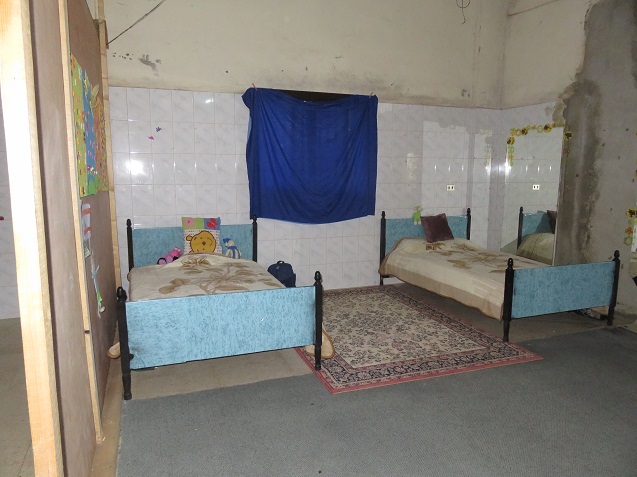
When Syria’s civil war intensified, Dalia and Abdullah were forced to abandon their comfortable life – her job as an English teacher, his thriving chicken farm, and the lush garden where Hadi (now 13), Mohammed and Taim (7) loved to play. Abdullah had retired earlier from a career as a first assistant in the Syrian army, but as the fighting escalated, he was summoned back. Fleeing to Lebanon seemed the only way to avoid being forced to kill. As it turned out, the family was exceedingly fortunate in being able to escape; not too long after, the Syrian army razed most of their little hamlet outside Homs – gutting their home, killing five of Abdullah’s friends who also had gone AWOL from the army and imprisoning his 30-year-old nephew, who was forced to give himself up to save his wife and 5-year-old daughter.
“I cry every time I watch the video,” Dalia told me, her eyes welling up. The video of her once beautiful home, now a burned shell, was shot by another of Abdullah’s nephews, who remains in the Syrian army to avoid his cousin’s unknown fate. “We just talked to him by phone two weeks ago, and he was crying. He doesn’t want to be there, to be part of what is going on.” Even if the young man could elude the army alive, Lebanon has stopped accepting new Syrian refugees, and entering illegally costs an excessive amount few can muster.
At first, Dalia, Abdullah and their boys crowded into the two-bedroom-one-bath apartment rented by her parents in Tripoli’s Baddawi camp, occupied primarily by Palestinians. But Dalia and Abdullah describe themselves as quiet “village people,” and they soon made their way to Bire looking for a more rural respite. The first shelter they found was an even more cramped, dank, two-room flat where I first met them on a previous trip to Lebanon in April. The crumbling, exposed-cement rooms rented for $250 per month, a sum that quickly burned through the funds they had managed to bring with them.
Their situation improved when Dalia was able to get a job teaching English in a private school run by a sympathetic Lebanese man whose brother, the original owner, was assassinated for his support of the early opposition to Syria’s president, Bashar al-Assad. The school opened its doors for an afternoon shift of free education for Syrian refugees, and Dalia had started volunteering almost immediately. Her effectiveness as a teacher soon attracted attention, and when one of the English teachers for the Lebanese classes suddenly quit, the headmaster gave her a chance. (Since Syrian refugees officially are prohibited from working, their jobs must be “under the table” – putting them at risk of exploitation, like other undocumented workers worldwide. Dalia and the other full-time teachers are paid only $300 per month.)
On this trip, I found them in their converted restaurant. Abdullah has managed to find semiregular work driving a bus for the same Lebanese school, to supplement his construction day labor. With their combined pay, they can cover rent and food. However, they are in debt to friends and relatives for more than $1,000, a small fortune for the family. Medical care, like the MRI Dalia needed recently for a suspected disc problem (a medical expense that I paid for), and luxuries like toys and books for the boys are out of the question. Fear is never far from their consciousness. When Dalia took a “service” (a shared car that is a very cheap form of transportation) to pick me up at the bus station in Tripoli, she left Abdullah at home. Men are routinely stopped by the military, and Abdullah’s Lebanese residency permit has long since expired.
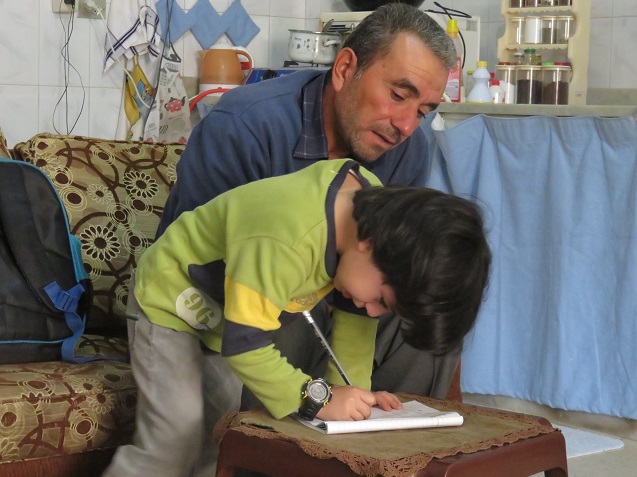
Still, Dalia and Abdullah are fortunate. They had relatives who could take them in for a short time and have managed to find some work, although it is illegal. Without those meager advantages, survival would have been next to impossible, as I am quickly reminded. Dalia’s employer takes me on a drive through the seemingly idyllic countryside, and when we turn down a country road, soon a few rows of old cement chicken coops appear. I look closer, and I see them: People. Families. Living in the coops.
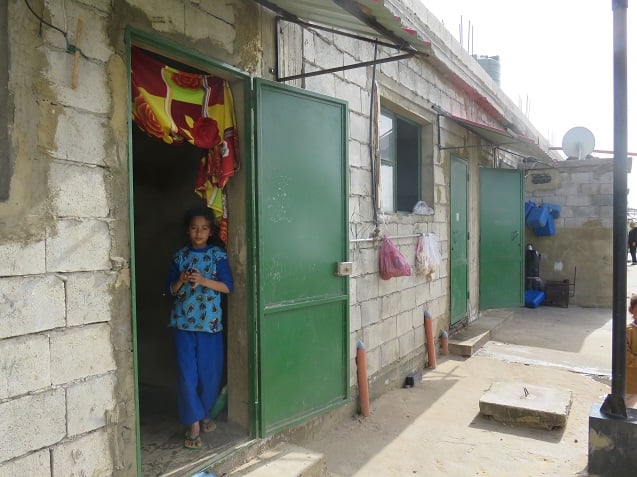
In each building, there are about 12 families. Mohammed Ghazi Harfoush explains to me through Rania, who serves as my interpreter, how they ended up there: “We are from the city of Koussair [south of Homs], very close to the border. After the demonstrations during the rebellion, the army destroyed so much. We had no food or medical care. We spent many weeks shuttling between our houses and the shelters we dug to get away from the bombs. “
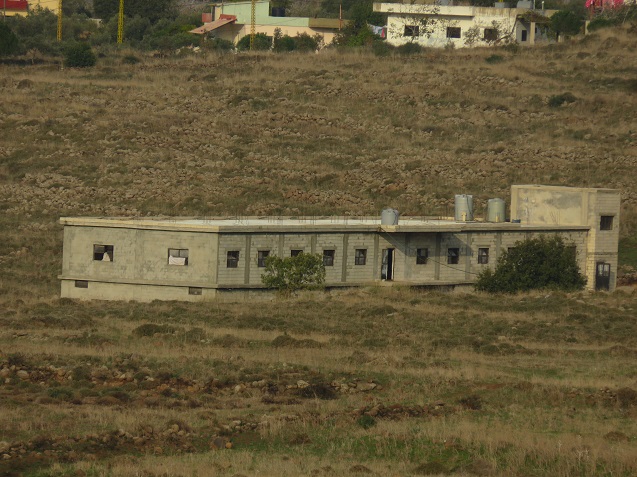
Mohammed has seven children; one, a baby girl, was born in their coop-turned-shelter, making her officially “stateless.” (Lebanon has not even allowed citizenship for Palestinians, despite the fact that many have lived there for decades. To be Syrian, the girl’s birth must be registered in person, in Damascus.) In 2013, the family and others fled on foot when they heard that a Hezbollah militia was entering the city to support the army. “They killed everyone they saw!” Mohammed said. “We were lucky to get out alive.”
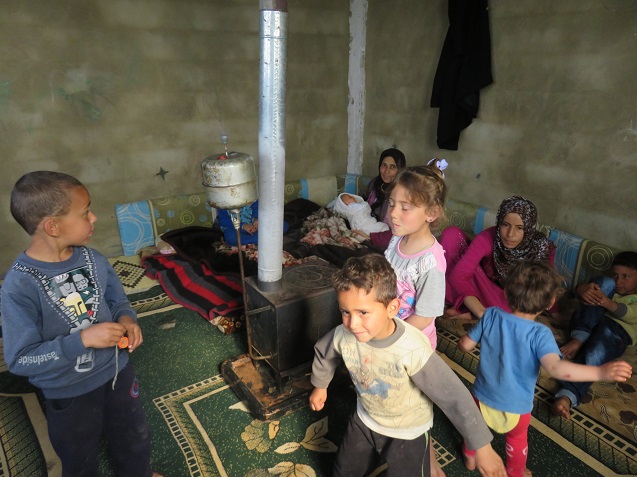
When they reached the border with Lebanon, the group paid about $300 per family to pass safely into the country. At first, they crowded into a school; they had no money left. Later, an aid agency gave them some tents. Fares Faisal Al-Harfoush, one of Mohammed’s relatives, explains why they eventually left: “There were seven families in just two tents, and it was so crowded that my youngest child was burned by a candle. Then we found a snake in his cradle. We applied to UNHCR [the Office of the United Nations High Commissioner for Refugees] to move someplace else, and that’s how we ended up in the coops. As bad as it is, the farmer who owns them is threatening to make us leave.”
Mohammed’s wife is struggling to afford milk and diapers for the new baby. The UNHCR-supplied “nutrition card,” worth $13 per month per person, is simply not enough. Five of her children do not attend school because they can’t afford the transportation. (The school where Dalia teaches, the closest one, is free, but transportation is not provided.)
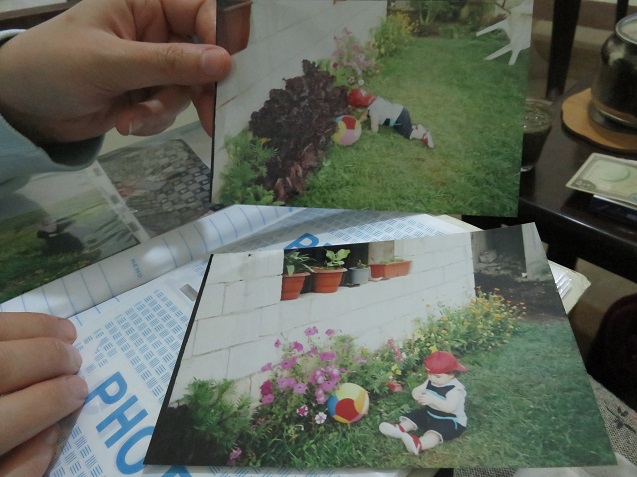
“I regret we came to Lebanon,” Mohammed’s wife said. “I wish we had just died.”
To date, the United States has accepted a mere 2,000 out of nearly 4 million Syrian refugees. Screening for “security risks” takes 18 to 24 months, compared to Europe’s average of four. I cannot help but wonder, when senators, representatives and presidents choose to send drones, military advisers or any other type of militarized intervention into another country (which I do not support), should they not acknowledge up front that there will be refugees – along with a responsibility to care for a reasonable share?
In my travels around Lebanon, I have seen refugees struggling with widely varying conditions. Some develop depression, with their already degrading surroundings falling into further disrepair as they sink into a metaphorical black hole. Others, like Dalia and Abdullah, manage to make whatever they can of wherever they are. At night before I fell asleep, I found Dalia down on her knees, sweeping up crumbs from their cold floors, after helping her children study for an exam the next day. Is this not a strength of character we should welcome into our country, while adding as little pain as possible to lives already stressed beyond most people’s imaginations?
“I think about my children’s future day and night,” Dalia told me. “In Syria, Hadi dreamed about being a doctor, Mohammed, a chef, and Taim, a pilot. I have no idea when or if we can ever return home, and how can they achieve their dreams here? Every day, their lives are slipping away.”
Note: Details from this article were adapted from Euro-Mediterranean Human Rights Monitor’s September 2015 report “Life in Limbo: Lebanon as a Microcosm of a Global Refugee Crisis,” researched and written on the ground in Lebanon by Pam Bailey.
Join us in defending the truth before it’s too late
The future of independent journalism is uncertain, and the consequences of losing it are too grave to ignore. To ensure Truthout remains safe, strong, and free, we need to raise $46,000 in the next 7 days. Every dollar raised goes directly toward the costs of producing news you can trust.
Please give what you can — because by supporting us with a tax-deductible donation, you’re not just preserving a source of news, you’re helping to safeguard what’s left of our democracy.